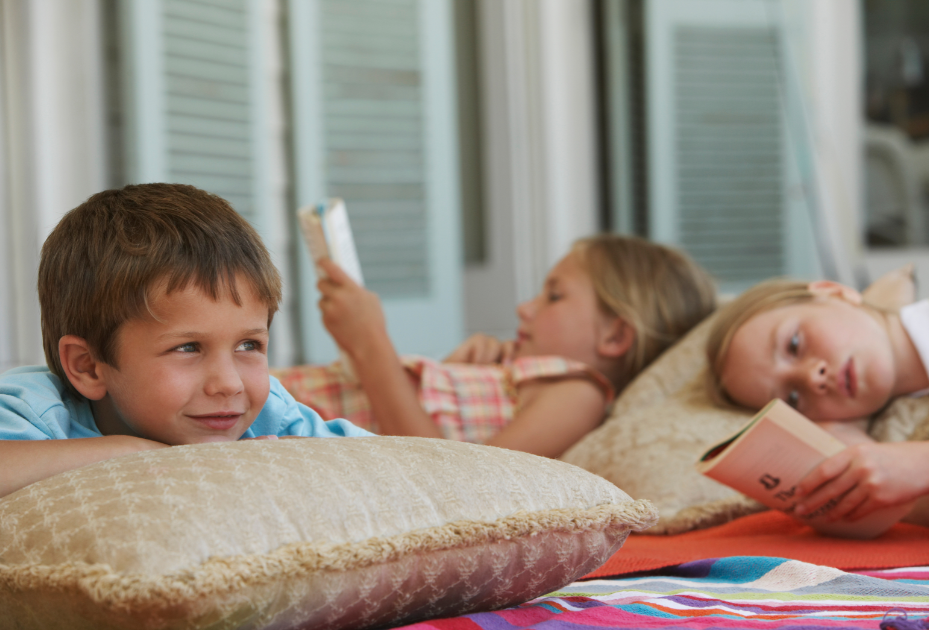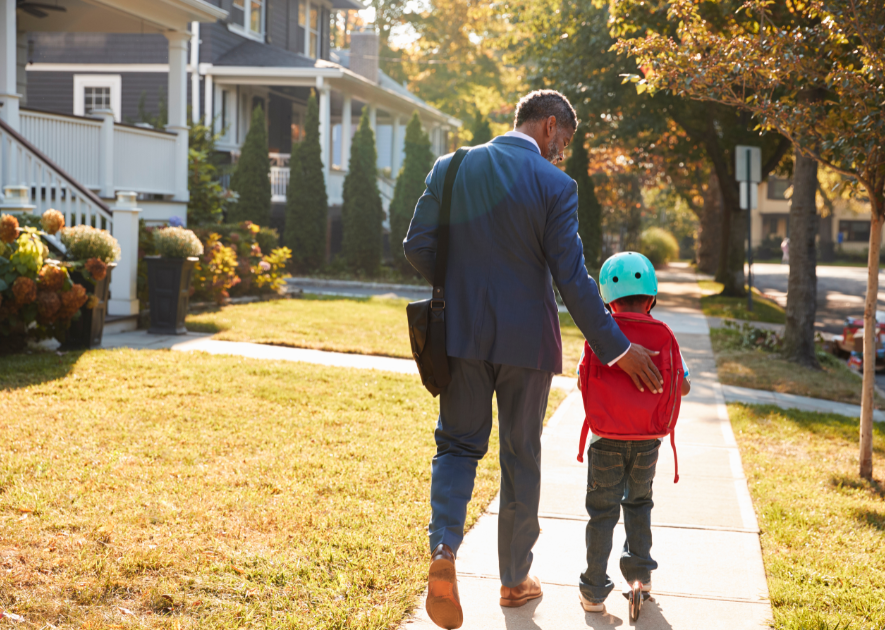What parents teach kids when we allow them to take a 'mental health day'
With zero hesitation—just a simple, "OK"—he turned the car around and took me home, and it's a lesson I've never forgotten.
With one turn of the wheel, my dad taught me a lesson about self-care in high school that I'll never forget.
When I was in high school, I woke up one morning feeling overwhelmed. I was an honors student, I was involved in various activities and clubs, and for whatever reason, I felt thoroughly unprepared for the day. I don't recall if I had a test or a presentation or if it was just a normal school day that I couldn't face—I just remember feeling like I'd hit a wall and couldn't make my mental gears turn right.
I usually walked the mile and a half to school, but I was running late so my dad offered to drive me. In the car, I tried to keep it together, but halfway to school, the tears started to fall. My dad looked over and asked if I was OK.
"I don't know," I sobbed. "I feel like … I just … I need a day."
He knew I wasn't sick. He could have told me to tough it out. He could have given me a pep talk. He could have forced me to go. But he didn't do any of those things.
With zero hesitation—and just a simple "OK"—he turned the car around and took me home.
I have no memory of what I did the rest of that day. Three decades later, the only thing that sticks out is the basic-but-profound lesson my dad instilled in me the moment he turned that steering wheel: It's totally OK to take care of yourself.
We talked about it briefly on the way home. As it turned out, he was also taking a "mental health day." My dad was a social worker and, as an adult, I can totally understand why he would need to take a random day off sometimes. But it didn't really matter what he did for a living. Most of us need an occasional mental health day—adults, teens, and kids alike.

Some schools have begun incorporating this understanding into their school attendance policies. Utah passed a bill in 2018 that allows a mental health day to count as an excused absence from school. Oregon enacted a similar law in 2019 and Arizona, Colorado, Connecticut, Illinois, Maine, Nevada and Virginia have followed suit. In a 2023 article, Verywell Mind noted all the US states that are either allowing student mental health days or have proposed bills to get the ball rolling.
“Mental health days are not only good for the practical aspect of giving young people a break," psychologist Caroline Clauss-Ehlers, Ph.D., told Healthline in 2020, "but they also validate that the community and society are saying, 'We understand and we’re supporting you in this way.'”
Occupational therapist Shelli Dry concurs, telling Healthline that acceptance of mental health days can help eliminate the stigma that often comes with mental illness.
“For schools to recognize that sometimes it’s better to take a mental health day than push through when you cannot seem to cope, is a tremendous support for students to feel understood and accepted, and [this, in turn, encourages] students to understand and accept themselves more,” she said.

Sometimes we forget how hard it is being a kid. In some ways, I think it's way harder than being an adult. Considering the fact that 1 in 6 kids between the ages of six and 17 experience a mental health disorder each year, we need to acknowledge that a lot of kids have days where they're struggling. But even kids who don't deal with mental illness sometimes need a down day. Modern life is busy and complex, no matter our age. Managing it all daily—and then also handling whatever extra stuff life throws at us—is a lot.
Part of good parenting is teaching kids to persevere through challenges, but encouraging perseverance has to be balanced with insight and wisdom. Sometimes kids might cry wolf, but it's important for parents to understand that kids might be dealing with more than we know. Sometimes kids need to be encouraged to dig deep for resilience. Sometimes kids have already been resilient for a long time and need a little time and space to just be.
My dad knew me. He understood that I wasn't just being lazy or trying to get out of doing something hard. He trusted me to know what I needed, which in turn taught me to listen to my inner alarm and trust myself. As a result, I've spent my adult life with a good sense of when I need to push through and when I need to pause and reset—a gift I'm immensely grateful for.
All of that said, this advice does come with a caveat. As a parent of kids who are learning to manage anxiety, mental health days can be a mixed bag. There's a difference between taking a mental health day because you really need it—which happens—and taking a mental health day to avoid facing fears—which also happens. Avoidance feels good in the moment but fuels anxiety in the long run, so parents and kids have to be aware of how the idea can be misused and unintentionally make certain mental health issues worse.

The bottom line, however, is that kids need breaks sometimes. And when you allow them to take an occasional day here and there to breathe, to do some self-care, to reconnect with themselves and reset their mental and emotional barometer, you teach them that their well-being matters. You teach them that it's OK to acknowledge when they've hit a limit and pause to recoup their strength.
It's OK to turn the car around when you know you need to. That's a lesson we all need to learn, and one we need to support with work and school policies in addition to internalizing individually. We're making some good strides toward that goal, and the sooner we all get on the same page, the better everyone's well-being will be.
To learn more about how to help kids and teens with their mental health and self-care practices, The Kids Mental Health Foundation has tons of resources for parents, caregivers, teachers, coaches, and more.
This article originally appeared three years ago.





 An exhausted mom looks at her laptop while kids play in the backgroundImage via Canva
An exhausted mom looks at her laptop while kids play in the backgroundImage via Canva An exhausted mom holds her newborn babyImage via Canva
An exhausted mom holds her newborn babyImage via Canva A mom relaxing in a chairImage via Canva
A mom relaxing in a chairImage via Canva
 Adam Scott Dancing GIF by Apple TV
Adam Scott Dancing GIF by Apple TV woman looking at the floor
Photo by
woman looking at the floor
Photo by  a woman looking out of a window with blinds
Photo by
a woman looking out of a window with blinds
Photo by  woman in gray hoodie smiling
Photo by
woman in gray hoodie smiling
Photo by  woman in black and white long sleeve shirt
Photo by
woman in black and white long sleeve shirt
Photo by  Check In Mental Health GIF by mtv
Check In Mental Health GIF by mtv black and white printed shirt
Photo by
black and white printed shirt
Photo by  Keep Moving Forward Mental Health GIF by INTO ACTION
Keep Moving Forward Mental Health GIF by INTO ACTION
Werner Herzog motivational posters are the best thing on the internet
The director with a cult following gets a tribute fit for guidance counselor office walls.
Werner Herzog inspirational art, FRIENDSHIP.
Looking for a little inspiration this afternoon, but don't actually want to be uplifted?
Well, then get a boost from the solemn Teutonic prose of legendary filmmaker Werner Herzog via the genius Tumblr project Herzog Inspirationals.
Take comfort and advice from the man for whom getting shot in the gut was NBD as you learn about the humble simplicity of the chicken or the inner life of birds.
ADVENTURE
via Werner Herzog Inspirationals/Tumblr
Universe is not harmony.
via Werner Herzog Inspirationals/Tumblr
HAPPINESS.
via Werner Herzog Inspirationals/Tumblr
HARMONY.
via Werner Herzog Inspirationals/Tumblr
Human life is...
via Werner Herzog Inspirationals/Tumblr
GRATEFUL.
via Werner Herzog Inspirationals/Tumblr
FRIENDSHIP.
via Werner Herzog Inspirationals/Tumblr
MISERY.
via Werner Herzog Inspirationals/Tumblr
CIVILIZATION.
via Werner Herzog Inspirationals/Tumblr
Eyes of a chicken.
via Werner Herzog Inspirationals/Tumblr
This article originally appeared on 09.18.17